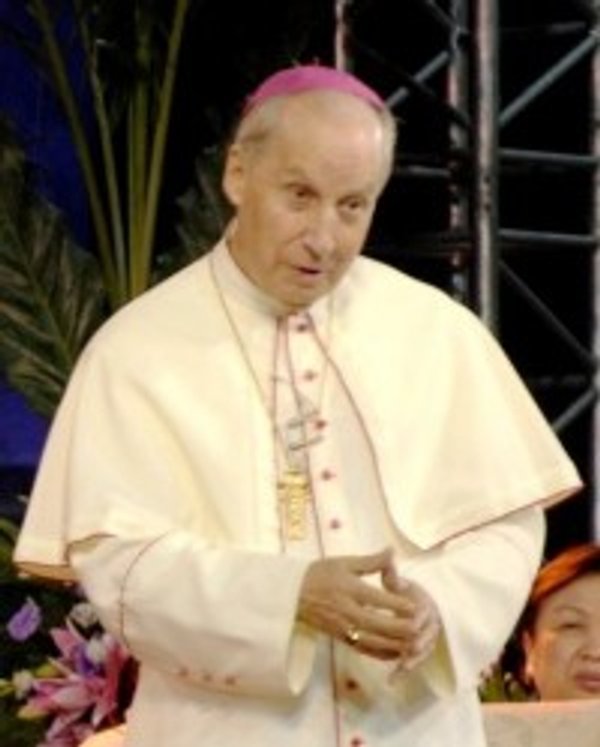MANILA, Philippines - For the second time in 10 years, Opus Dei prelate Javier Echeverría visited the Philippines in July 27-August 1. At the July 29 afternoon get-together in the SMX Exhibit Halls, Conrad Ricafort, information officer of Opus Dei, estimated the crowd at 10,000.
Before coming to Manila, Echeverría was in New Delhi, Hong Kong, Macau, Sydney and Auckland. He left Manila last Friday to be in Singapore and Mumbai. It was a pastoral visit to the Opus Dei in the Philippines, their families and friends. He also visited some social and educational projects. Accompanying him was Msgr. Joseph Duran, regional vicar of Opus Dei in the Philippines.
As prelate, Echeverría is the spiritual father to the members of Opus Dei in 70 countries. He wants to be with his children and to personally confirm them in their vocation to serve the Church and society. In the talk at the SMEX gathering, he urged his children to remain true daughters and sons of God. Bishop Echeverría is the second prelate of Opus Dei; the first was Alvaro del Portillo who succeeded the founder, St. Josemaría Escrivá, when the saint died on June 26, 1975. Bishop Portillo died in March 1994.
Participants in the gathering were people from all walks of life, some coming from Visayas and Mindanao.
History
As early as the mid-1940s, the founder of Opus Dei, Josemaría Escrivá, had already been requested by Alberto Balcells, a Spaniard who had settled in the Island of Negros, to send people of Opus Dei to the Philippines. At the time, however, Opus Dei was focused on its work of evangelization in Western Europe and the Americas.
The opportune time came when two young Filipinos, Bernardo Villegas and Jesus Estanislao, returned to the Philippines in 1964 from their studies at Harvard University in the US. While at Harvard, the two of them attended activities organized by Opus Dei at Elmbrook University Center, located at the very heart of campus. They later joined Opus Dei.
In 1964, the apostolate of Opus Dei started in a small house on C. Ayala Street in Singalong, Manila, close to some colleges where some of the first members of Opus Dei were studying. Villegas and Estanislao were joined in late 1964 by two priests from Spain: Fr. José Morales and Fr. Javier de Pedro; and a young engineer, Manila-born José Rivera. By April 1965, the apostolic activities moved to a bigger house in Malate where the Maynilad Study Center became a venue for education and training of both university students and professional men.
Women
In October 1965, Sole Usechi, Lali Sastre and Maria Teresa Baron arrived from Spain to start the work of Opus Dei with women. Through the help of Doña Luisa Lorenzo, whom they had met in Madrid, a modest house was acquired on Leon Guinto Street in Singalong, Manila.
Rina Villegas was the first Filipino female student to join Opus Dei in December of that year. When the Mayana School of Home and Fine Arts for women was established in 1966, the apostolic activities with married women and house helpers began. Tanglaw Residence for female students was established in 1967.

During the meeting with Echeverría, I met Lali Sastre, who told me she came to the Philippines in 1965 when she was 23 years old. Escrivá asked her through a friend of hers that she join Opus Dei.
Originally from Barcelona, Lali has worked with Opus Dei for the past 40 years. One of the reasons, she said, why there was such a crowd that afternoon was because many, both rich and ordinary people, were attracted to this way of life. Sanctifying oneself through one’s work by offering one’s job as a service for the greater glory of God, instead of just making money, leads one to a spiritual path.
University of Asia and the Pacific
In August 1967, Estanislao and Villegas established a business and economic think tank called Center for Research and Communication (CRC), which would later on develop into a full-blown university, the University of Asia and the Pacific, in 1995.
CRC was an instrument for Opus Dei to carry the Church to the workplace, imparting Catholic teachings to professionals in journalism, law, business, education and other professions.
